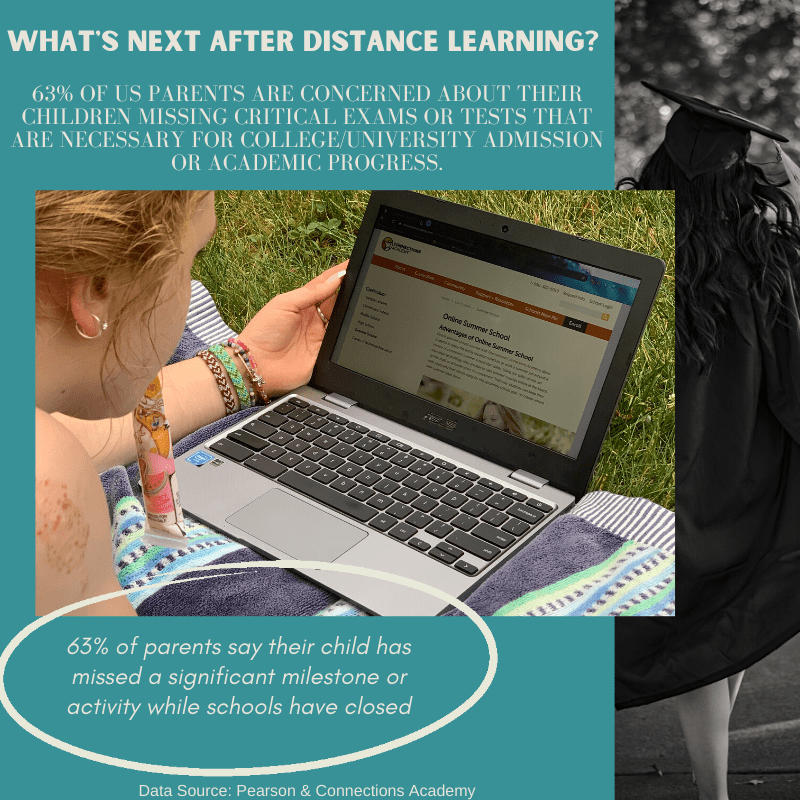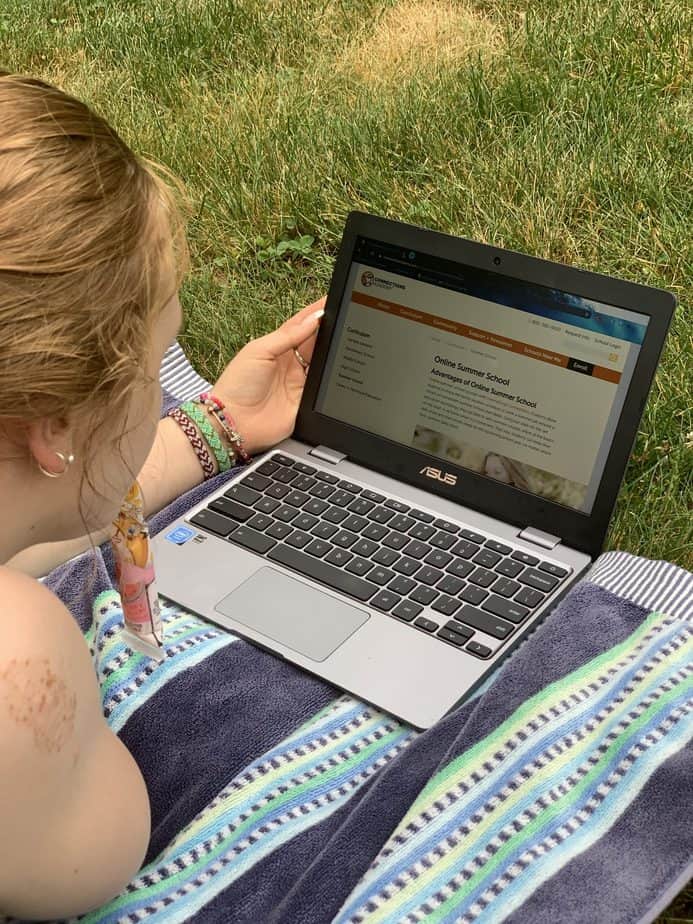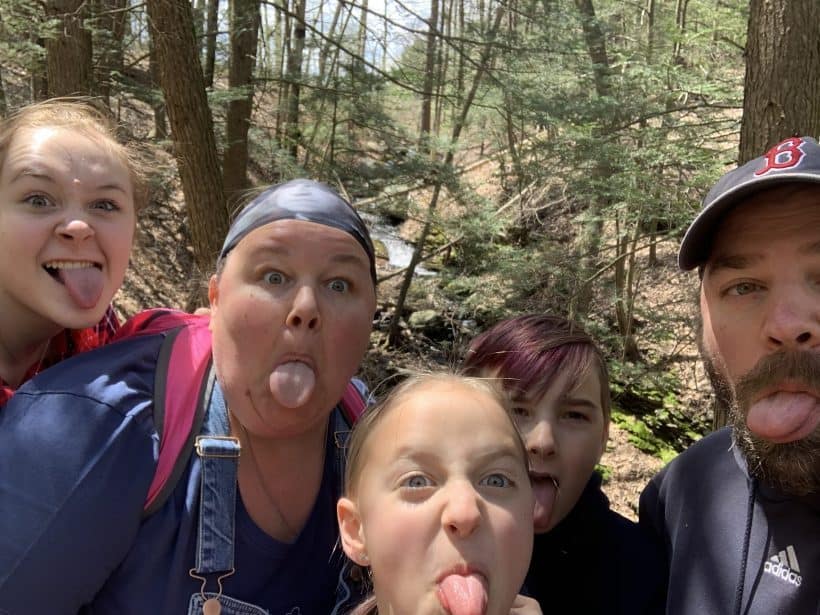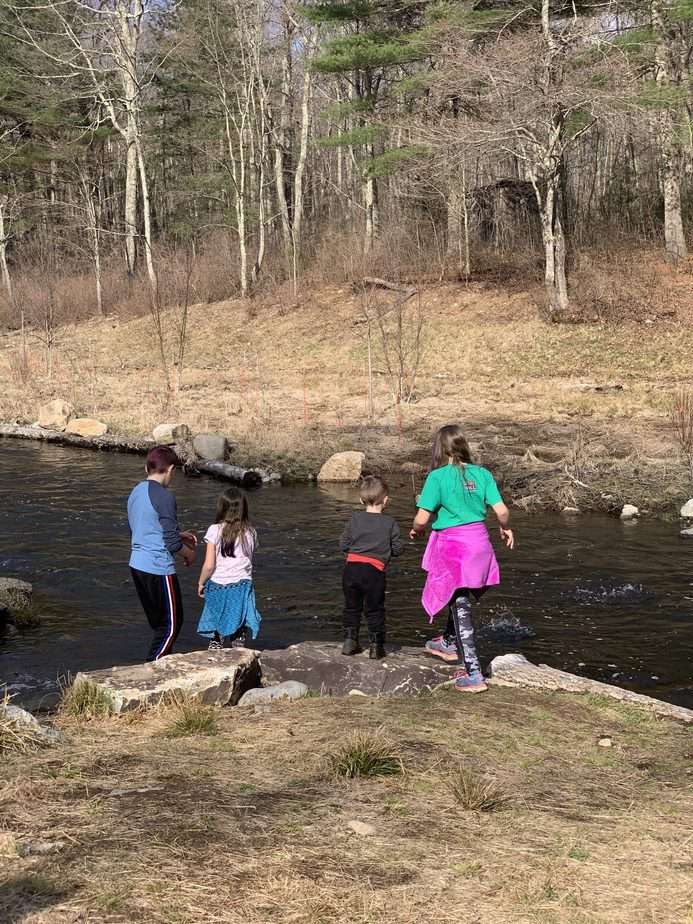As the school year comes to a close in the next few weeks for many schools and the long days of summer are within reach, families are facing the reality of canceled summer camps, trips, activities and more. The world is slowly opening back up, but the reality is that this summer is going to look very different than what most of us view as normal. I’m working with Pearson & Connections Academy to discuss how to help our children maintain academic, social, mental and emotional well-being during this long-lasting transition.
Preventing Summer Slide and Burnout after Distance Learning
Summer Slide Prevention
There is a large gap in what parents expect and are seeing in terms of a digital education.
Schools shut down and the vast majority of schools put together a distance learning plan very quickly. There wasn’t time to formulate a deliberate plan of action nor to train educators and paraprofessionals in online teaching, so I know many parents are feeling a bit concerned that this year, the summer slide may be a big one. This is not to say anything negative or bad about any schools or teachers- none of us knew what the COVID-19 outbreak would bring nor how long it would impact our lives, and digital learning wasn’t necessarily something anyone’s thought to plan for “just in case” until March of 2020.
I have friends all across the US of all ages, and some have expressed frustration that their children’s schools have not taught new material to them since early March, because their districts weren’t able to provide an equal opportunity to all and so all work was review based.
Parents of school-age children are grappling with a lot of emotions—like a sense of confidence that learning can continue online that sits alongside a lingering worry that their kids may fall behind.
More than two-thirds are concerned their children may fall behind due to school closures, values that are higher now than in March (69% US present vs. 64% US March.)
- 63% of US parents are concerned about their children missing critical exams or tests that are necessary for college/university admission or academic progress.

When my kids were little, we did a lot of workbooks in the summer. As they’ve gotten older, we’ve all kind of lost interest in the workbooks, because they are a lot less “fun” and a lot more “work”! A lot of parents, including myself, are thinking about summer schooling options because of the current world situation. If digital learning continues in the fall when school begins, many parents feel like continuing online learning in some form through the summer will benefit their child(ren). With online summer school courses, kids can learn from just about anywhere, as long as they have Wi-Fi or a hotspot available.
Getting ready for next year- or ahead for next year
Online summer school can offer many benefits for kids in K-12! It can help keep a consistent learning routine for kids, prevent summer slide, boost their comprehension of learned skills, and even introduce new skills and concepts to master. Connections Academy’s summer learning program through International Connections Academy offers options to keep learning going with an accredited summer school for credit or enrichment, which is reassuring to see as a parent whose children have not been challenged academically for months. They even have rolling start dates for classes so you can sign up and begin on a timeframe that works best for your family. Through International Connections Academy, your children can:
- Earn necessary credits to move forward and acquire the skills to succeed with High School Credit Recovery courses.
- Prepare for life after High School with Career and Technical Education courses that combine both college preparation and workforce skills development.
- Review foundational skills and catch up with peers with Summer Smarts Math and Language Arts for grades K–8.
- Combine essential reading and math skills with technology instruction while making learning fun and relevant through Educational Technology courses for grades K–8

Many, many parents of high school kids have also expressed concerns about AP Exams and SAT testing prep/dates/retakes and how this will impact their child’s college admissions. With activities canceled or drastically changed this summer, it is a great time to invest some time and money in courses or test prep classes in order to give kids a leg up on those tests when they are again available.
Emotional Well Being
Parents still worry about mental health effects broadly. 58% of parents say the disruption of school has contributed to their child’s stress, anxiety levels or mental health issues
I remember about 3 weeks into the quarantine, we were on a family hike, and one of my littles asked me why they’d been feeling so tired and wanting to sleep all of the time. They didn’t understand feeling so tired, because they “just” did school and hikes/bike rides with us but didn’t have to go to school or soccer practices as normal. I had to explain to them that their world turned upside down when the state shut down, and it’s normal to have some new or different feelings, including feeling tired, when big changes happen like that.
Their response was that they weren’t “that” affected because they just don’t go to school or soccer. We had a long chat about how ⅔ of their life shut down suddenly and with no notice, and that they certainly were “that” affected.
I would be lying if I told you all of my kids have thrived being at home. One of my kiddos has had a very difficult time with being home full time, and while going to school is not their favorite thing, the social interactions, lessons, teachers, lunches, friends, bus rides and everything that goes into a school day are what they miss desperately. This is a kid who hasn’t ever been a big sleeper- not at night, and definitely not for napping…but this kid has been napping even twice a day at times.
Stress relief, self-care and resilience are more important now than ever before. I recently learned from a partnership Connections Academy did with the National Resilience Institute just how important it is to raise our children to be resilient. Low resilience in youths can be worrisome, as a lack of resilience can contribute to poor behavioral control and social skills, and even educational struggles, like not graduating high school on time.

Adults and kids alike need to find activities they enjoy or that help them release stress. My husband and I started the process of painting the trim, molding and windows throughout our downstairs (I loathe sanding, but quite frankly, the repetition has actually become therapeutic for me). This works for our family, but Connections Academy has had many families share that attending Connections Academy has not only boosted their student’s grades/GPA, but it has alleviated them from the stressful situations that brick-and-mortar schools sometimes encourage and has improved their mental health overall. Their offerings such as Guidance Lessons, Small Group Counseling, National LiveLesson sessions and more serve as tools to help students build resilience.
What also helps us is all kinds of art, doing crafts, gardening, baking, cooking, writing, exercise, calming and meditation exercise, light hearted media viewing- these are all ways that each of us can work to help decrease our stress and help ourselves as we navigate these weird times we are living in. We just have to find things that we can do that give our spirits a boost and help us get through each day.
Social Well Being
I’m writing this post and my older daughter is listening to an update from her high school principal. In the update, he’s discussing students returning textbooks and materials to school, the best way to do that, and also gives directions to seniors to pick up their diplomas and other materials. He is sharing the timing of a car parade for the seniors to do through town on the way to their graduation, which is going to take place at a local drive-in movie theater. This year is like no other, and for kids having promotions to middle or high school, from preschool to Kindergarten, these milestones are not what anyone is used to.
63% of parents say their child has missed a significant milestone or activity while schools have closed
Most everything was shut down with no notice in March. Winter sports championships never happened, spring sports tried to begin but weren’t able to take place, year-end competitions for state and regional areas were canceled, award ceremonies haven’t happened, field trips and special events in school were canceled as well.
That’s why any social connections are crucial right now. We have had a few friends “over” for bike rides, with a parent dropping their child and bike off here, and the kids go for a ride, then have a picnic snack and hang out in the yard six feet or so apart.
We’ve also figured out which of our kids needs what for social time, and so when our son gets all of his school stuff and chores done, he’s got a few hours to do some XBOX gaming with his buddies who are also on at that time. Our youngest does well with video chats.

As things open up and we all feel more confident expanding our little bubbles from quarantine, we can do hikes and bike rides perhaps with a few friends, or perhaps to go the beach with another family. We’ll be going to church this Sunday for the first time- service is to be held in the parking lot, with no singing, but we’ll be gathered and together and it’s a big jump from watching services on You Tube as we’ve been doing.
How are you preventing summer slide and burnout after distance learning? Do you have tips to add?